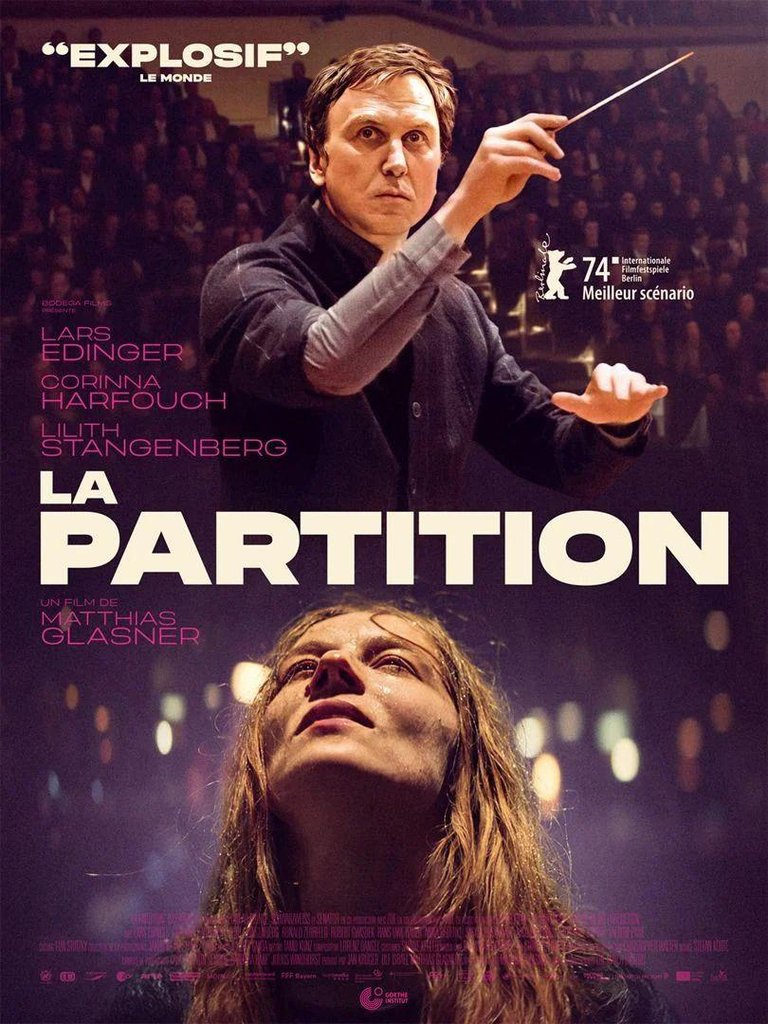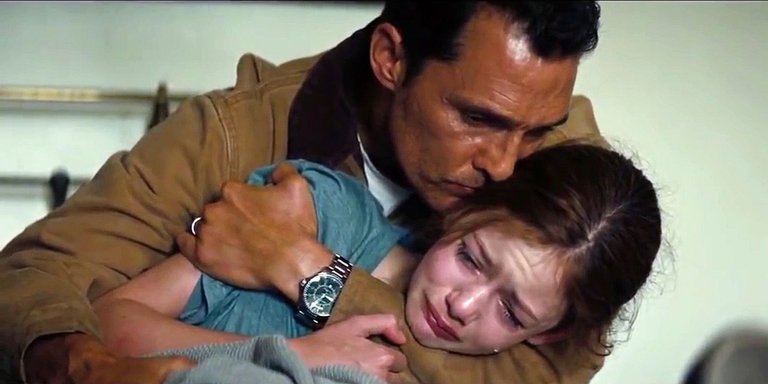
Oso de Plata al Mejor Guión en el Festival de Berlín
For some, film festivals are a pretentious thing. Not because they are held in luxurious places or anything like that, but because - as some people claim - they seem like spaces only for experts on the subject and although I understand where that thought comes from, the truth is that these festivals are open to every public. Anyone can come and live the experience. Now, the fact that most people get discouraged when a 180-minute long German film is announced and by not making the effort they miss out on a great work and with it the opportunity to discuss it with the experts who do attend the screening, is also true, but whose fault is that?
Para algunos, los festivales de cine son una cosa pretenciosa. No porque se celebren en lugares lujosos ni nada parecido, sino porque - según alegan algunas personas - parecen espacios sólo para entendidos en la materia y aunque entiendo de dónde viene ese pensamiento, la verdad es que estos festivales están abiertos a todo público. Cualquiera puede venir y vivir la experiencia. Ahora bien, que la mayoría se desanima cuando se anuncia una película alemana de 180 minutos de duración y por no hacer el esfuerzo se pierden de una gran obra y con ella la oportunidad de conversarla con los entendidos que sí acuden a la función, también es verdad, pero ¿de quién es la culpa?
In recent years, an increasing number of films have appeared that exceed two hours in length, approaching or slightly exceeding three hours. Whether it's a fashion or not, I cannot say, but the Germans cannot be accused of having been infected by it because they were already making longer films and as examples we can mention Toni Erdmann and Werk ohne Autor. And now we must also include Sterben (Dying), written and directed by Matthias Glasner, a drama with an enormous and varied emotional charge. Let's start with the title of the film: Dying. We immediately think that someone is dying, or is going to die, or died, perhaps more than one person, and that makes us think that we are watching a film that deals with grief, the pain after loss, funerals, etc.... It would be the most obvious thing, of course, but art has ways of surprising us with the unexpected or with a greater dose than anticipated. In Sterben we meet the Lunies, a dysfunctional family with two adult children, Tom and Emma, and two elderly parents, on the verge of senility, Gerd and Lissy. At first we see that Gerd is sick and his wife can no longer take care of him alone, but that doesn't mean Lissy is okay. She also suffers from a terrible illness, which means that both parents are in the final stretch of their lives. However, this doesn't seem to matter - or at least not much - to his two children who are quite busy with their respective lives.
En los últimos años han aparecido cada vez mayor cantidad de películas que sobrepasan las dos horas de duración, acercándose o sobrepasando por un poco las tres horas. Si es una moda, o no, no sabría decirlo, pero no puede acusarse a los alemanes de haberse contagiado de ello porque ya venían haciendo films más largos y como ejemplo podemos mencionar Toni Erdmann y Werk ohne Autor. Y ahora debemos incluir también Sterben (Dying), escrita y dirigida por Matthias Glasner, un drama con una enorme y variada carga emocional. Partamos por el título de la cinta: Morir. Inmediatamente pensamos que alguien está muriendo, o va a morir, o murió, tal vez más de una persona, y eso nos hace pensar que estamos ante una película que trata con el duelo, el dolor tras la pérdida, funerales, etcétera... sería lo más obvio, claro, pero el arte tiene formas de sorprendernos con lo inesperado o con una dosis mayor de la anticipada. En Sterben conocemos a los Lunies, una familia disfuncional con dos hijos adultos, Tom y Emma, y dos padres ancianos, al borde de la senilidad, Gerd y Lissy. Al principio vemos que Gerd está enfermo y que su esposa ya no puede cuidarlo sola, pero eso no significa que Lissy esté bien. Ella también sufre de una terrible enfermedad, lo que quiere decir que ambos progenitores se encuentran en la recta final de sus vidas. Sin embargo, esto parece no importar - o al menos no mucho - a sus dos hijos que están bastante ocupados con sus respectivas vidas.

Tom is an orchestra director and is preparing the presentation of a work composed by a friend of his (by the way, the name of that composition is the same as that of the film), but he also finds himself in the middle of different emotionally demanding situations: His girlfriend gives birth to a girl who is not his daughter, but another man's; There is, of course, the illness of his father and his mother; his composer friend threatens suicide once again; and besides, Tom has an affaire. But despite all that, Tom is almost always seen calm, or at least we don't see him fall prey to despair despite the different dramatic situations that arise.
Tom es director de orquesta y se encuentra preparando la presentación de una obra compuesta por un amigo suyo (por cierto que el nombre de esa composición es el mismo que el de la película), pero también se encuentra en medio de diferentes situaciones emocionalmente demandantes: su novia da a luz a una niña que no es hija de él, sino de otro hombre; está por supuesto la enfermedad de su padre y la de su madre; su amigo compositor amenaza una vez más con suicidarse; y además, Tom tiene una amante. Pero a pesar de todo eso, a Tom se le ve casi siempre tranquilo, o al menos no lo vemos caer preso de la desesperación a pesar de las diferentes situaciones dramáticas que se presentan.
Sterben is structured in chapters and most of them are tragic and dramatic. Changing the focus from one character to another, the director uses non-linear time to tell us a little about the Lunies. First we see Gerd, then Lissy, and then Tom, and although there are some funny and amusing scenes, for the most part these chapters are quite dramatic. I think it would have been very difficult to endure the 180 minutes of the film if that had been the tone of the entire film, but in the middle of those chapters, the director shows us something different, the story of Emma, Tom's sister, who's the opposite of him that someone can be. Tom inherited music from his parents and that's why Emma, despite having a good singing voice, wanted to do something different and studied to become a dental assistant. But it's not just that, the girl is a true whirlwind of self-destruction. Alcoholic, reckless, passionate, indomitable, Emma lives her life with an intensity that you only have when you are fleeing or chasing something. It's as if she were driving straight into a wall and instead of braking the girl stepped on the accelerator. But in the midst of that intensity, Lilith Stangenberg's performance gives us scenes as repulsive as they are hilarious, and as funny as they are uncomfortable, allowing one to relax in the seat and forget for a while about the imminent death of her parents and the gloom of certain conversations between Tom and his mother.
Sterben está estructurada en capítulos y la mayoría de ellos resultan trágicos y dramáticos. Cambiando el foco de un personaje a otro, el director va utilizando un tiempo no lineal para contarnos un poco sobre los Lunies. Primero vemos a Gerd, luego a Lissy y después a Tom, y aunque hay algunas escenas graciosas y divertidas, en su mayoría estos capítulos son bastante dramáticos. Creo que habría sido muy difícil soportar los 180 minutos de duración del film si ese hubiera sido el tono de toda la cinta, pero en medio de esos capítulos, el director nos muestra algo diferente, la historia de Emma, la hermana de Tom, que es todo lo opuesto a él que alguien puede ser. Tom heredó la música de sus padres y por eso Emma, a pesar de tener buena voz para cantar, quiso hacer algo diferente y estudió para convertirse en asistente dental. Pero no es sólo eso sino que la chica es un verdadero torbellino de autodestrucción. Alcohólica, temeraria, apasionada, indomable, Emma vive su vida con una intensidad que sólo se tiene cuando se está huyendo o se está persiguiendo algo. Es como si fuese conduciendo directo hacia un muro y en lugar de frenar la chica pisara el acelerador. Pero en medio de esa intensidad, la actuación de Lilith Stangenberg nos regala unas escenas tan repulsivas como hilarantes, y tan divertidas como incómodas, lo que permite que uno se relaje en el asiento y se olvide un rato de la muerte inminente de los padres de Tom y de lo lúgubre de ciertas conversaciones mantenidas entre él y su madre.

Tolstoy wrote in one of his most famous works that “All happy families are alike, but unhappy ones are each in their own way”. And the Lunies have a very particular way of not only being unhappy but of isolating each one with respect to the other members of the family nucleus. It's as if they were not a family but a group of strangers who once lived in the same house and who now go their separate ways dedicated to living their lives. This view may seem quite cold, especially for Latin American audiences or audiences from countries where the family is the center of people's lives.
Tolstoi escribió en una de sus obras más famosas que “Todas las familias felices se parecen, pero las infelices lo son cada una a su manera”. Y los Lunies tienen una forma muy particular de ser no sólo infelices sino de aislarse cada uno con respecto a los demás miembros del núcleo familiar. Es como si no fueran una familia sino un grupo de extraños que alguna vez vivieron en la misma casa y que ahora andan cada uno por su lado dedicados a vivir su vida. Esta mirada puede parecer bastante fría, especialmente para las audiencias latinoamericanas o de países en los que la familia es el centro de la vida de las personas.
Throughout the three hours that Sterben lasts we can feel or witness resentment, pain, regret, grief, guilt, trauma, jealousy, joy, success, failure, betrayal, loyalty and we face important moral dilemmas and also to other more artistic ones, does a person have the right to take their own life? Should the rest of us prevent it at all costs? To what extent can the artist simplify his work to make it accessible to the public without betraying himself and his original idea? Does blood weigh? what is paternity? Are parents responsible for their children's failure? Do children owe their parents a debt to care for them in old age? There are many more questions that one could ask about the issues raised by a film that, in addition to being very well written, has a perfect soundtrack for the story. I can't say that the three hours fly by, but I would be lying if I said that the movie felt heavy to me. And I think that telling a story with so much drama and so much emotional charge for three hours and not overloading the viewer is a great merit. For that alone it's worth Sterben and if we add the philosophical content, the performances, the music, the script, the funny moments and the reflections, we obtain a film that, despite its title, is not depressing because precisely in the midst of darkness the light stands out more. Talking about death and reflecting on it is also a way of reflecting on life. Have any of you seen this movie? I read you in the comments.
A lo largo de las tres horas que dura Sterben podemos sentir o presenciar rencor, dolor, arrepentimiento, duelo, culpa, traumas, celos, alegría, éxito, fracaso, traición, lealtad y nos enfrentamos a dilemas morales importantes y también a otros más artísticos, ¿tiene una persona el derecho a quitarse la vida? ¿los demás debemos impedirlo a toda costa? ¿hasta dónde puede el artista simplificar su obra para hacerla accesible al público sin traicionarse a sí mismo y a su idea original? ¿pesa la sangre? ¿qué es la paternidad? ¿son los padres responsables del fracaso de sus hijos? ¿tienen los hijos una deuda con sus padres de cuidarlos en la vejez? Son muchas más las preguntas que uno podría hacerse alrededor de los temas planteados por una película que además de estar muy bien escrita tiene una banda sonora perfecta para la historia. No puedo decir que las tres horas pasen volando, pero mentiría si dijera que la película se me hizo pesada. Y creo que contar una historia con tanto drama y tanta carga emocional durante tres horas y no sobrecargar al espectador es un gran mérito. Sólo por eso ya vale la pena Sterben y si agregamos el contenido filosófico, las actuaciones, la música, el guion, los momentos divertidos y las reflexiones, obtenemos una película que a pesar de su título, no resulta deprimente porque precisamente en medio de la oscuridad resalta más la luz. Hablar de la muerte y reflexionar sobre ella es también una forma de reflexionar sobre la vida, ¿alguno de ustedes ha visto esta película? Los leo en los comentarios.





Sin haber visto este filme, con tu inteligente reseña, los usuarios tenemos una valiosa apreciación de él; realización que llama nuestra atención tanto por el tema tan complejo que trata, como por la forma como lo aborda, según tu comentario. Saludos, @cristiancaicedo.
Muchas gracias por tu valoración y comentario. Saludos.